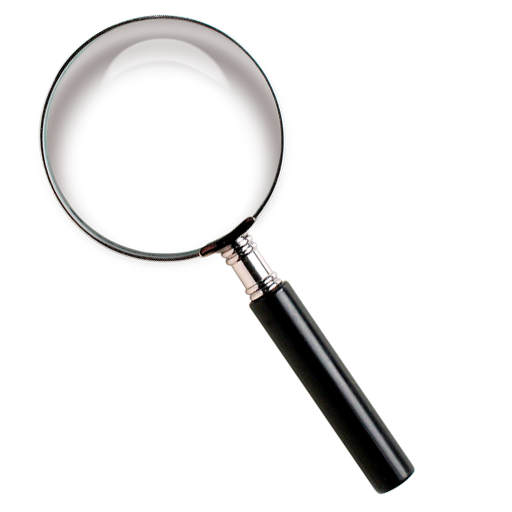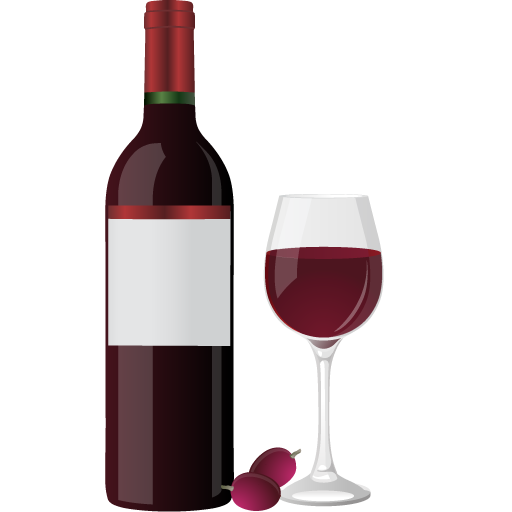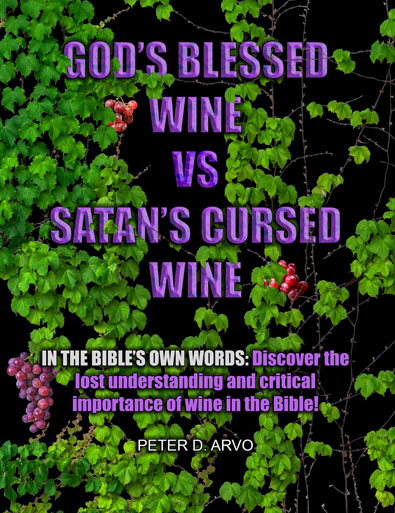ANSWERING THE QUESTION: IS DRINKING A SIN?
Did you know that the word wine had multiple meanings in dictionaries when the first English Bibles were translated?
Did you know that God’s wine contained a blessing, Isaiah 65:8, and another wine contained a poison, Deuteronomy 32:33?
For the first time in modern times, The Seven Golden Rules of Bible Interpretation have been applied to answer the question once and for all if drinking is a sin according to the Bible.
ON THIS PAGE: We provide a quick summary for your convenience of the exhaustive research results derived from utilizing The Seven Golden Rules of Bible Interpretation to better understand wine in the Bible as it relates to sin.
This biblical wine research project produced well-referenced evidence-based answers and solutions to questions that have been obscured to the majority of modern biblical scholars, theologians, pastors, and priests.
SUMMARY OF 'IS DRINKING A SIN' RESEARCH RESULTS
1. At the time the King James Bible was translated to English, the term wine had multiple meanings. Wine was defined as: The juice, fermented or unfermented, of various fruits or plants, used as a beverage, sauce, syrup, etc. (See hyperlinked references50, 51, 52, 53, 54)
2. When reviewing every instance of the term wine(s) and winebibber(s) in the Bible, there is without question a conflict unless more than one type of wine is being spoken of. See The Bible Wine Test Chart and corresponding document The Bible Wine Definition Test.
3. As shown in the chart One Sip: Disrupts the Brain’s Neurological Pathways, any quantity of alcohol can have a neurological impact on the brain, which affects a person’s ability to think clearly.
4. We learned through this research that alcohol causes cancer and other harm to the body and that there is no safe amount per WebMD55, the National Institute on Alcohol Abuse and Alcoholism, which is a division of the National Institute of Health56, 57 and the National Cancer Institute58. Also see the Alcohol’s Effects on the Body Chart.
5. It is more difficult to preserve juice from grapes by making alcoholic wine as compared to other methods. For example, boiling and jarring the liquid from grapes or boiling it into syrup has fewer steps. See the Biblical Wine Preservation Chart for details.
6. Research into the ‘wine mixed with water purification theory’ does not hold up to scrutiny. Water wells worked just fine to obtain uncontaminated drinking water over the long term. See Genesis 21:19, 24:43, 45; Proverbs 5:15. More information is also contained in the book "God's Blessed Wine VS Satan's Cursed Wine".
7. There is no ordinance in the Torah (Five Books of Moses) that wine with alcohol is to be used in ceremonies, which is also confirmed by Louis Ginzberg, Professor of Talmud.16
8. During the wedding in Cana of Galilee, would Jesus have turned water into wine that contained alcohol and got people drunk? The supposed ‘Diluted Wine Theory’ does not hold up to scrutiny. See Matthew 18:6, Mark 9:42, Habakkuk 2:15, and also Romans 14:21.
9. The Jews may have picked up the bad habit of drinking wine containing yeast fermented alcohol during their Babylonian exile, which could be why God’s loyal servant, Daniel, would not drink it. See Daniel 1:8.
10. Warm water was sometimes mixed with wine (unfermented syrup wine), which could foreshadow the sinless blood and water that poured forth from Jesus on the cross.59
11. Leaven (yeast) is not to be anywhere within a Jewish home for Passover, which is also known as the Feast of Unleavened Bread (Luke 22:1). Leaven (yeast) is also not to be consumed during Passover, which would include yeast in alcoholic wine (Exodus 12:19-20).
12. There are at least fifteen Bible verses about being sober. See Titus 1:8, 2:12, 1 Peter 1:13, for some examples. We have already shown that one sip of alcohol has a neurological impact on the brain’s ability to think clearly, which is also consistent with how the word sober is used in the Bible as well as how it is defined in old dictionaries around the time the word sober was chosen to be used in the early English Bibles:
abstinent, modest, to be of sound mind, temperate,28 moderate, discreet in behavior, serious, grave, modest, temperance,29 wise, prudent, frugal, thrifty, good, wholesome, seriousness, command of himself, modest, orderly, obedient, keeping good company, sane, in good state of body, found of memory, well in his wits, in his right mind, knowing, composed, undisturbed, true, sincere, earnest, staid, chaste, moderate,30 piety represented as a lady with sober countenance, still, calm.31
13. At least one King James Translator, George Abbot, stated he knew of many Torchbearer groups and was himself a Puritan. His fellow translator, Samuel Ward, wrote against drinking alcohol.63 Many additional references are in the book God's Blessed Wine VS Satan's Cursed Wine.
Who or what is a Torchbearer? A Torchbearer is a person or leader that carries and preserves a torch; who imparts knowledge, information, and truth to others. See The Torchbearer Series for more information on this topic.
14. At least one past King of England not only spoke out against the health drinkers (of alcohol), but also passed laws against them.70
15. Most Christians that had a lineage tied to the ancient Torchbearer groups were in favor of banning all alcohol in the United States of America and succeeded for a time.71
16. Many churches were against alcohol and considered it a great moral issue during the Prohibition time period, except for Roman Catholic and German Lutheran communities who were in favor of alcohol use. See the newspaper ad in The Scranton Republican, Saturday, May 17, 1930, which was paid for by Methodist, Baptist, Presbyterian, Episcopal, Congregational, and Evangelical denominations against alcohol use. Another newspaper article about Prohibition uses the term "Torch Bearer" in Washington County News, Thursday, January 1, 1920.
17. The Sixty-Fifth Congress investigated the alcohol Brewer’s Association with criminal charges against them outlined in three large volumes, which included but were not limited to, "secret methods to control party nominations, party machinery, whole political parties, and thereby control the Government of State and Nation". Their secret methods and infiltration later successfully caused a change in the government's stance on alcohol use and over time many churches would also change their stance.72
18. God’s holy character and his ideal for us are more in alignment with healthy non-alcoholic wine, as compared to Satan’s unholy character associated with alcoholic wine. One type of wine contains a blessing (Isaiah 65:8) and the other contains a poison (Deuteronomy 32:33). Many Bible verses and charts on this site are available which demonstrate the differences.
TWO QUESTIONS: For those unfamiliar with how truly holy God is and his desire for us to pursue his holy ways, ask yourself these two multipart questions:
FIRST QUESTION: There is a universal consensus that at the very least the Bible condemns drunkenness. Since no one can know what their alcohol consumption limit is until they become drunk the first time, would God have set a standard that no one can follow until they have violated it once? No other sins work that way. You don’t have to commit some theft or some murder before you realize you sinned, so why would you have to drink till drunkenness sets in the first time to know you sinned?
SECOND QUESTION: Alcohol is not a food or a vitamin and there is no biblical basis for its consumption. So if you had to err on one side or the other, would you rather err on the side of believing God to be more holy, and him expecting us to follow his more holy example? Or would you rather err on the side of thinking God is less holy and that he consumes cancer-causing alcohol (Isaiah 28:7)? Which stance do you think to be more closely associated with Satan (Deuteronomy 32:33, Proverbs 23:32, Revelation 12:9)?
Note: For the same reasons alcohol is condemned in the Bible, all mind-altering drug use, whether legal or illegal, are also by implication condemned by the Bible.
Last Changed/Updated On: 2-20-2023

FURTHER RESEARCH AND RESOURCES
There are several choices to view well-referenced information on Is Drinking a Sin by using the website menu system above or clicking on the links below:
#1 Obtain the BOOKS.
#2 Download the free CHARTS.
#3 Attend the BIBLE COURSES.
#4 Watch the VIDEOS.
Become one of the few to more deeply understand the mystery of wine in the Bible, as well as thoroughly answer the question, Is Drinking a Sin?
BIBLIOGRAPHY – NOTES – REFERENCES – WORKS CITED
Note: All reference numbers also match the reference numbers listed in the book called, "God's Blessed Wine VS Satan's Cursed Wine".
16 Ginzberg, Professor Louis. “A Response to the Question Whether Unfermented Wine May Be Used in Jewish Ceremonies.” The American Jewish Year Book 5684: Volume 25, September 11, 1923, to September 28, 1924: p.402. Link1 | Return to text⤴
28 In The Royal Dictionary In two parts - First French and English, By Abel Boyer, p.19.(abstinent), p.355 (modest), p. 502 (to be of sound mind), p.534 (temperate). 1702. Link1 or Link2 | Return to text⤴
29 In John Kersey’s Dictionarium Anglo-Britannicum or A General English Dictionary, by John Kersey, p.429 (moderate), p.429 (discreet in behavior), p. 590 (serious), p.603 (grave, modest), p.640 (temperance). London: J. Wilde, 1708. Link1 or Link2 | Return to text⤴
30 In Benjamin Marin’s Lingua Britannica Reformata or A New English Dictionary, by Benjamin Marin, p.282 (wise, prudent), p. 332 (frugal, thrifty), p.340 (good, wholesome), p.342 (seriousness), p377 (command of himself), p.420 (modest), p.442 (orderly, obedient, keeping good company), p.548 (sane, in good state of body, found of memory, well in his wits, in his right mind, knowing), p.558 (composed, undisturbed), p.562 (true, sincere, earnest), p. 590 (staid), p. 623 (chaste, moderate). London: J. Hodges, 1748. Link1 or Link2 | Return to text⤴
31 In Nathan Bailey’s New Universal English Dictionary of Words and of Arts and Sciences, by Nathan Bailey, p. 443 (piety represented as a lady with sober countenance), p. 568 (still, calm). London: W. Johnston, 1760. Link1 or Link2 | Return to text⤴
50 In The Royal Dictionary In two parts - First French and English, by Abel Boyer, p.579. 1702. Link1 or Link2 | Return to text⤴
51 In John Kersey’s Dictionarium Anglo-Britannicum or A General English Dictionary, by John Kersey, p.697. London: J. Wilde, 1708. Link1 or Link2 | Return to text⤴
52 In Benjamin Marin’s Lingua Britannica Reformata or A New English Dictionary, by Benjamin Marin, p.700. London: J. Hodges, 1748. Link1 or Link2 | Return to text⤴
53 In Nathan Bailey’s New Universal English Dictionary of Words and of Arts and Sciences, by Nathan Bailey, p.652. London: W. Johnston, 1760. Link1 or Link2 | Return to text⤴
54 Dictionary Staff. “Wine.” Dictionary.com. 2019. Link1 | Return to text⤴
55 WebMD Staff. “How Alcohol Affects Your Body.” WebMD.com. 2019. Link1 | Return to text⤴
56 Institute Staff. “Alcohol Alert.” National Institute of Health. 2019. Link1 | Return to text⤴
57 Institute Staff. “Alcohol's Effects on the Body.” National Institute of Health. 2019. Link1 | Return to text⤴
58 Institute Staff. “Alcohol and Cancer Risk.” National Institute of Health. 2019. Link1 | Return to text⤴
59 In Dr. William Smith's Dictionary of the Bible: Volume 4, by William Smith, p.3545 (p.866). Boston: Houghton, Mifflin and Company, 1892. Digital link was unavailable. | Return to text⤴
63 In Woe to Drunkards: A Sermon, by Samuel Ward. London: John Grismand, 1627 (originally printed 1622). Link1 | Return to text⤴
70 In The Acts Made in the First Parliament of our Most High and Dread Sovereign Charles the First, p.220. 1683. Link1 | Return to text⤴
71 In The Cornhill Magazine: Volume 16, by George Smith, p.195. London: Smith, Elder & Co., 1867. Link1 | Return to text⤴
72 In Brewing and Liquor Interests and German and Bolsehewik Propaganda: Report and Hearings of the Subcommittee on the Judiciary United States Senate: Submitted Pursuant to S. RES. 307 and 439, Sixty-Fifth Congress: Relating to Charges Made Against the United States Brewer's Association and Allied Interests: In Three Volumes, Volume 1. Washington: Government Printing Office, 1919. Link1 | Return to text⤴
Be sure to take a look at the additional vital information contained in the CHARTS, BOOKS, VIDEOS, and BIBLE COURSES sections.
Wine as defined by dictionaries around the time the King James Bible was translated by the 47 translators:
"Wine: The juice, fermented or unfermented, of various fruits or plants, used as a beverage, sauce, syrup, etc."
Nathan Bailey’s New Universal English Dictionary 1760 | A New English Dictionary by Benjamin Marin 1748 | A General English Dictionary by John Kersey 1708 | The Royal Dictionary in Two Parts by Abel Boyer 1702

